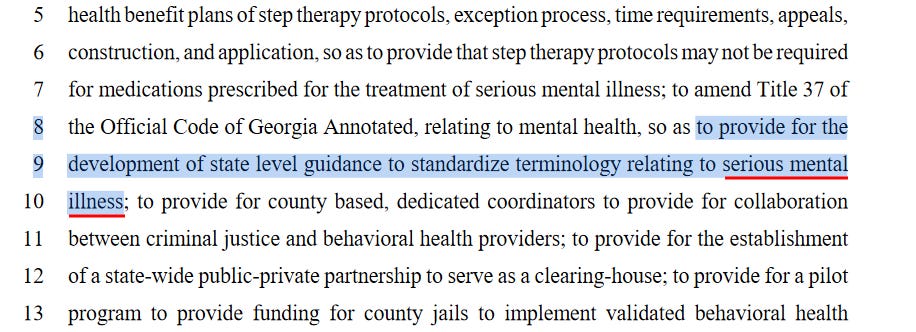'Serious Mental Illness' in HB520
How to Define 'Serious Mental Illness' by not Defining it at all
Generally, when crafting legislation to present for passage during the Georgia General Assembly, a dutiful author will dedicate at least one section of the bill to defining the terms in use under its provisions. Without stringent definitions of the specific terms used in the legislation, neither law enforcement nor the courts possess adequate means to judge the law’s intent and to know whether the law is being followed.
But in this year’s General Assembly, one high-profile bill now before the Georgia Senate, having passed overwhelmingly in the House, stands in utter disregard of that vital principle. That bill is HB520, vaguely entitled, “An Act.” According to the bill’s opening summary, HB520 has as one of its purposes (lines 8-10) “to provide for the development of state level guidance to standardize terminology relating to serious mental illness.”
Now one would think that a bill designed to fulfill the very purpose of defining and standardizing terminology relating to “serious mental illness,” would at least define what it means by the term, “serious mental illness.” Instead, however, HB520 goes out of its way to NOT define that term. In fact, HB520 states openly that the term describing the human condition the bill is designed to affect will itself not be defined within its provisions, but the bill will instead authorize bureaucrats in the Department of Community Health to define it at some undisclosed time in the future, albeit no later than December 1, 2023, long after the HB520 would become law.
Now, I’m just watching this movie along with you. I don’t know why the bill’s sponsor would draft legislation with the stated intent of defining terms into law, but then farm out the task of defining the bill’s most important term to others down the road. But I do know this, that now is no time in our nation’s history to allow a government bureaucrat, or panel, or committee, or commission, or a singular elected official, or certainly not an international organization such as the WHO, which is likely where all this goes, to define what it means to possess ‘serious mental illness,’ the converse of which, by the way, defines the group of individuals the government considers sane. That is an Orwellian discussion. The promoters of this bill argue that serious mental illness is a large and growing problem among the population. That may be. However, the answer to that problem is not to allow the question of who does and who does not possess serious mental illness to be defined vaguely, or allow that term to be politicized, used as a weapon against those with whom a regime of career bureaucrats disagrees politically.
In the last several years we have seen more than a few government agencies weaponized to execute indefensible policies against political adversaries for purposes well-other than those intended in their original authorization. HB520 invites that kind of political abuse to be inflicted on the citizens of Georgia. No more does the Georgia General Assembly need to be annually considering mammoth, comprehensive bodies of legislation designed to remedy every possible ill of society. No more does the Georgia General Assembly need to be annually considering massive new bureaucracies to administer such legislation once it is made law. No more does the Georgia General Assembly need to be requiring the public to invest its wealth in creating frameworks for selected private parties, businesses or even entire industries to derive profits. The purpose of Georgia Government is clear. It is stated plainly in the opening paragraph of its Constitution. It is only,
To perpetuate the principles of free government, insure justice to all, preserve peace,
promote the interest and happiness of the citizen and of the family, and transmit to posterity the enjoyment of liberty, relying upon the protection and guidance of Almighty God.
That’s it. Fulfilling that purpose is the only authority Georgia State Government possesses. Any act of Georgia Government designed and implemented outside of that purpose falls under a term clearly defined by our founders in the Declaration of Independence. That term is, “tyranny.” It is time for the Georgia General Assembly to stop the madness, reconsider its purposes as defined under the Georgia Constitution, and return to strictly adhering to those purposes.







